 Petzlover
Petzlover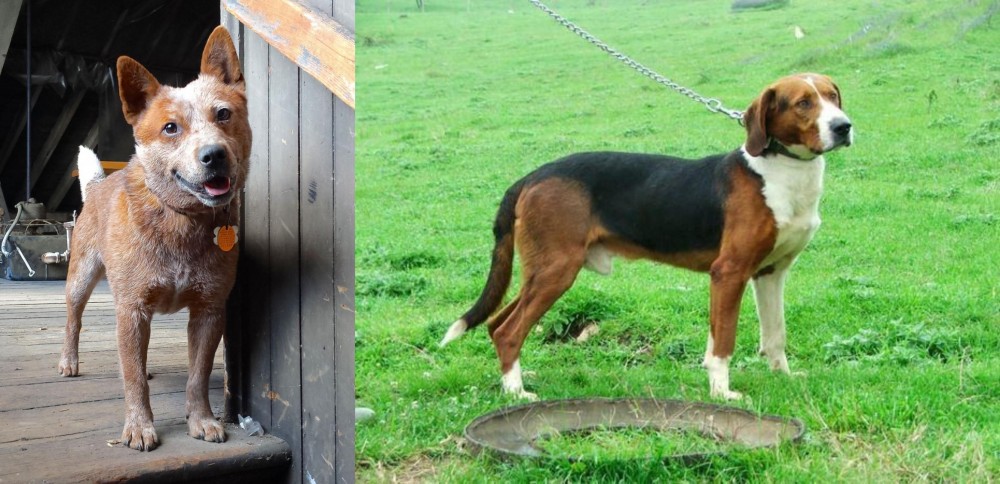 Red Heeler is originated from Australia but Serbian Tricolour Hound is originated from Croatia. Both Red Heeler and Serbian Tricolour Hound are having almost same height. Red Heeler may weigh 9 kg / 19 pounds lesser than Serbian Tricolour Hound. Both Red Heeler and Serbian Tricolour Hound has same life span. Both Red Heeler and Serbian Tricolour Hound has almost same litter size. Both Red Heeler and Serbian Tricolour Hound requires Low Maintenance.
Red Heeler is originated from Australia but Serbian Tricolour Hound is originated from Croatia. Both Red Heeler and Serbian Tricolour Hound are having almost same height. Red Heeler may weigh 9 kg / 19 pounds lesser than Serbian Tricolour Hound. Both Red Heeler and Serbian Tricolour Hound has same life span. Both Red Heeler and Serbian Tricolour Hound has almost same litter size. Both Red Heeler and Serbian Tricolour Hound requires Low Maintenance.
 Known also as the Australian Cattle Dog, the Red Heeler is also known as the Blue Heeler. This is a breed of herding dog originally developed in Australia.
Known also as the Australian Cattle Dog, the Red Heeler is also known as the Blue Heeler. This is a breed of herding dog originally developed in Australia.
These dogs are known for their stamina and resilience with driving cattle over long distances in hot weather and across rough terrain.
It was George Eliott who developed the Red Heeler – crossing native Dingoes with Collies and other herding dogs.
In America, the breed was fully recognised in September 1980.
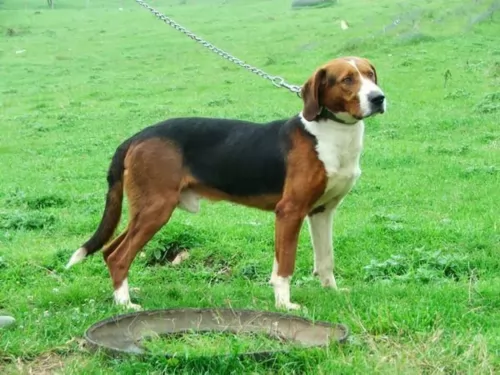 The Serbian Tricolour Hound was once known as the Yugoslavian Tricolour Hound. It’s a rare dog breed that you won’t find much outside of the Balkans.
The Serbian Tricolour Hound was once known as the Yugoslavian Tricolour Hound. It’s a rare dog breed that you won’t find much outside of the Balkans.
These dogs were bred for hunting in packs but in these more modern times they are more of a companion dog.
It is thought that the Serbian Tricolour Hound was a variant of the Serbian Hound until 1946 when a separate breed standard was established. It was recognized by the Federation Cynologique Internationale in 1961.
 The Red Heeler is a medium-sized dog standing at between 43 to 51 cm in height and weighing in the region of 14 – 16 kg.
The Red Heeler is a medium-sized dog standing at between 43 to 51 cm in height and weighing in the region of 14 – 16 kg.
He is muscular, with a sturdy build. The coat of this robust dog is shortish and thick and quite often you’ll find a white star marking on he forehead. The coat is a blue-grey color or reddish. The tail of this dog is long and the ears are erect.
The Red Heeler has always been a working dog so he is energetic and lively, being independent and strong-willed.
He is super intelligent too and can be easily trained and socialized. He is a dog that simply loves the outdoors and if you don’t live on a farm, he is going to need lots of exercise.
He gets on well with kids and other pets, but children should be taught to respect him and be kind towards him, otherwise he might not tolerate them. He is a loyal, protective dog, wanting to ensure the safety of his human family.
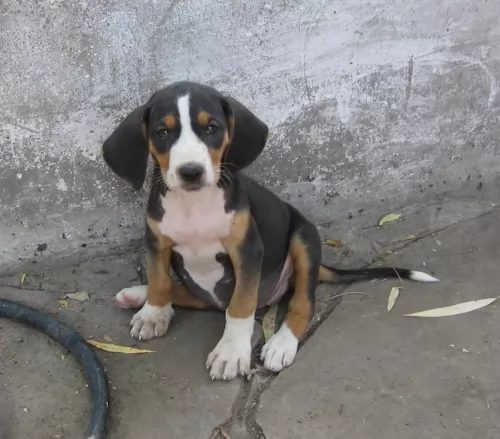 The Serbian Tricolour Hound is a medium sized dog standing at between 44 to 55cm in height and weighing in the region of 20 to 25kg.
The Serbian Tricolour Hound is a medium sized dog standing at between 44 to 55cm in height and weighing in the region of 20 to 25kg.
He is a strong, muscular, solidly built dog with a rounded skull and longish muzzle. The ears of this dog are long and floppy and the long, curved tail hangs down but is held high when the dog is excited.The dog has a short, glossy coat which is essentially a rusty color. There is quite a lot of black with some white on the coat too.
Loving and loyal, this dog was once used for hunting and he has learned to listen carefully to- and respond well to his owner.
He loves his human family and makes a great family pet. He gets on well with the kids, loving to take part in their games. He is intelligent and with training and socialization he is obedient, well balanced and well mannered.
Friendly and social, all he wants is to be with his human family, but even so he is better suited to life with a family who lives on a large property in the suburbs or countryside as opposed to living in the city.
 When you bring a Red Heeler into your home, you must know that you’re never going to have a dull moment. They’re not content to lie around with nothing to do. These popular dogs literally coax you to come out and to be active.
When you bring a Red Heeler into your home, you must know that you’re never going to have a dull moment. They’re not content to lie around with nothing to do. These popular dogs literally coax you to come out and to be active.
Red Heelers need lots of activities and lots of room, so they aren’t particularly suited to life in the city. Large properties and plenty to do is what they ask for.
Your Red Heeler is going to make a splendid pet, loyal and devoted, the perfect example of man’s best friend.
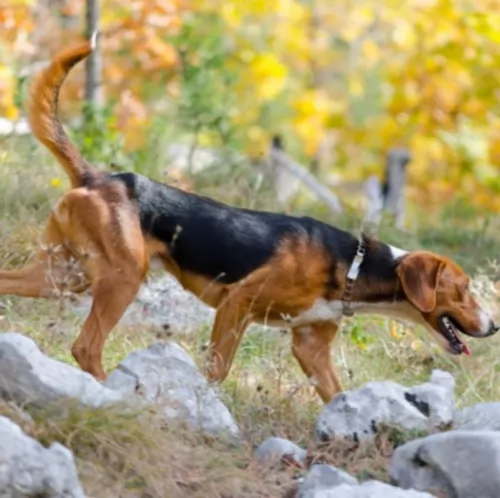 The Serbian Tricolour Hound is a loving, loyal, active, devoted breed that loves his human family, wanting to be involved in all the activities they’re involved in.
The Serbian Tricolour Hound is a loving, loyal, active, devoted breed that loves his human family, wanting to be involved in all the activities they’re involved in.
He is somewhat reserved with strangers but training and socialization helps to make him well behaved around them and it means you can take him with you wherever you go as he is well behaved.
These Serbian dogs make splendid pets, and if you take good care of yours, he will provide you with unconditional love.
 Your Red Heeler can live to be 15 years of age with good care. Every dog however, can fall prey to some of the many common dog diseases there are, some of which can be -
Your Red Heeler can live to be 15 years of age with good care. Every dog however, can fall prey to some of the many common dog diseases there are, some of which can be -
There are quite a lot of congenital and inherited musculoskeletal disorders in dogs, with some of the more common ones being hip dysplasia and muscular dystrophy for instance.
There are some of these musculosceletal problems which can be fatal. Some of the typical symptoms you’ll see with these problems are difficulty climbing stairs or jumping, loss of muscle mass in the hind limbs, arthritis and lameness.
The retina of the eye is that light-sensitive part and which is part of the central nervous system. With retinal degeneration, the cells decline, leading to impaired vision and sometimes even blindness.
Some symptoms to look out for include dilated pupils, night blindness and the inability to see clearly in bright light. The disease worsens over times with sudden blindness being quite common with older dogs. Your vet will want a thorough history of your dog’s health.
Other dog diseases to be very aware of are cancer, obesity, bloat, hip dysplasia and epilepsy.
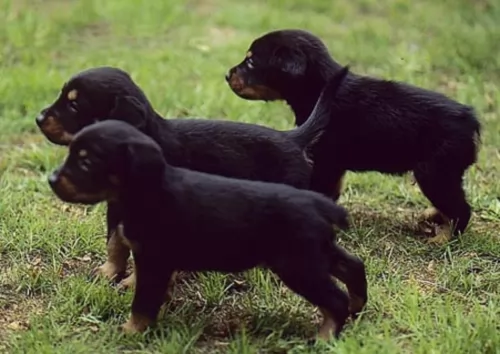 The Serbian Tricolour Hound is such a healthy dog breed and with the right nutrition and exercise can reach 12 to 15 years of age. He is a rare dog breed so there isn’t a whole lot of information available about his health.
The Serbian Tricolour Hound is such a healthy dog breed and with the right nutrition and exercise can reach 12 to 15 years of age. He is a rare dog breed so there isn’t a whole lot of information available about his health.
There are always going to be those common dog illnesses that many dogs succumb to. Some of them are hip dysplasia, cancer, skin problems and parasites.
With his floppy ears, check out the insides of his ears to ensure there are no signs of redness and ear discharge.
Hip dysplasia is a condition where parts of the hip joints don’t fit properly together. This creates a situation where there is abnormal wear and tear on the joints. It can lead to arthritis even and pain for your dog.
The tapeworm is a parasite spread to dogs but also to people and it is through the ingestion of infected fleas. You can often detect this when you discover parts of the worm crawling in your dog’s bowel movements.
Check your dog over for ticks and fleas too when you brush him as these can lead to other illnesses such as tick bite fever.
 The Red Heeler is an active dog, and apart from walks which will give him the chance to sniff around, he will need lots of other forms of exercise. Rope pulling games he’ll love and running after a ball will please him because it takes him back to days when he used to run around and herd livestock.
The Red Heeler is an active dog, and apart from walks which will give him the chance to sniff around, he will need lots of other forms of exercise. Rope pulling games he’ll love and running after a ball will please him because it takes him back to days when he used to run around and herd livestock.
If you’re an outdoorsy type of person who loves hiking in the wilds and swimming in rivers, you can count this dog in.
You can look at the Red Heeler as a low maintenance dog. He does shed, but a good brush of the coat twice a week will be excellent for him. If he doesn’t wear his nails down naturally, you will need to trim them. Also, while you are brushing him, check his ears and eyes and inside his mouth to make sure he is clear of all infections.
Red Heelers rely on good food for their resilience and stamina, and for convenience it is good to have commercially manufactured dog food as a backup. The best is home-made food which is easy to prepare and totally uncomplicated.
Simply add into one big pot chicken, brown rice or pasta and spinach, sweet potatoes and carrots. This food can all be chopped up, refrigerated and added warmed up and in small portions to your pet's dry kibble once or twice a week. Simple and tasty, your Red Heeler will love it and thrive on it too.
Ensure there is always a bowl of fresh, cool water within his reach.
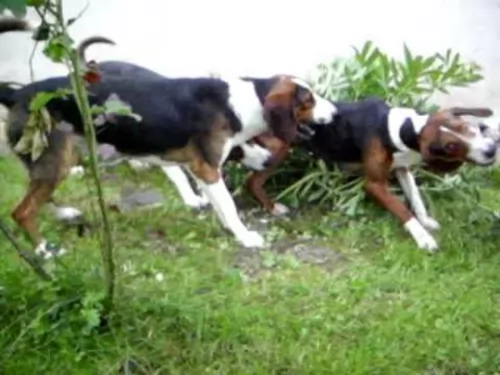 The short, shiny coat of the Serbian Tricolor Hound will require nothing more than a good brush twice a week to keep the coat nice and smooth. You can even take a damp cloth and wipe the coat over with it to remove dust.
The short, shiny coat of the Serbian Tricolor Hound will require nothing more than a good brush twice a week to keep the coat nice and smooth. You can even take a damp cloth and wipe the coat over with it to remove dust.
Provide your dog with a regular amount of exercise every day. Dogs become sad and unhealthy when they’re just stuck in the back yard and left on their own. Take him for walks each day and throw a ball for him to fetch. Simple little games like this will keep him happy as he loves to spend time with you.
Only the very best food is good enough for a dog. Dry kibble is excellent and convenient but try and feed your dog some home-made food too. Avoid spicy, exotic foods as this can upset your dog’s digestive system. Speak to your vet if you’re unsure how to feed your dog to ensure his good health and longevity.